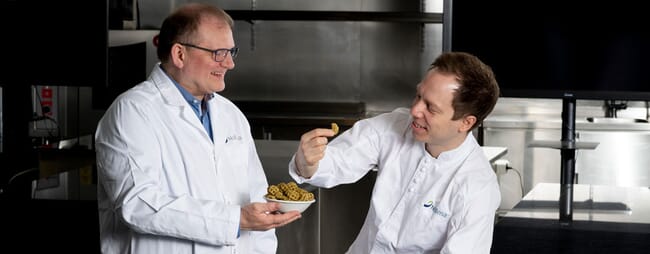
© Jan Inge Haga, Nofima
The project is being undertaken by Sjy Seaweed, a Norwegian startup, together with Nofima and they have now produced a crisp-like product that contains 7.5 per cent kelp.
“We wanted to create a product that people would not only eat once a year, but all year round. In this way, we can create year-round jobs,” says Leonore Olsen, one of the founders of the seaweed startup.
For the development of the new kelp product, Nofima used its extrusion expertise to give the product a porous and brittle texture, similar to cheese puffs.
Plenty of research was conducted into product composition and taste. Kelp can be used both as a flavouring and as a salt replacement. But they have to decide what kind of kelp is most suitable. Winged kelp has a lower iodine content than sugar kelp and can therefore be used in slightly larger quantities, but is just as effective as a salt substitute. Moreover, the two types also provide a wide range of flavours and they ended up opting for a combination, adding potato, corn and plant fats.
“One of the products, which is seasoned using salt only, provides a fresh and salty taste of the sea, while the product seasoned using penny bun mushrooms dampens the kelp flavour somewhat and provides a different sensation in the mouth and more of an umami flavour,” says Nofima scientist Stian Gjerstad Iversen, who is part of the project.
Dagbjørn Skipnes, another Nofima scientist, is a kelp specialist and has played a key role in the development work.
“On the basis of my areas of research, I assist the food industry with everything from documentation of heat treatment to production facilities. This also includes the selection of methods and equipment for processing,” explains Skipnes.
He leads a major research project called TastyKelp, a project funded by Nofima itself.
One of the areas that will be studied as part of the project is the components of seaweed and kelp that can be used as ingredients in the food industry. Macroalgae are one of the largest renewable resources in the world, but these species are not widely exploited in the Nordic region. Sustainability is important to Nofima and macroalgae is therefore a strategic area of focus.
A focus on seaweed and kelp is also important from a government standpoint, as Norway’s Minister of Fisheries and Seafood, Odd Emil Ingebrigtsen, reflects.
“I am pleased to hear about startup companies investing in sustainable food production from the sea. There are a number of resources in the sea that have yet to be exploited. There is a lot of interest in seaweed and kelp and we are seeing several exciting initiatives throughout the country. In this context, it is important to us that we help ensure safe seafood. We therefore require broad development of knowledge and research that can be transferred to the business community,” he said.
Great potential
In recent years, the focus has been on the cultivation, processing and extraction of sugar kelp in particular. In spite of the great potential for value creation, the Norwegian kelp industry still faces many challenges. The most important challenges are lack of market knowledge, food safety with regard to real iodine content and the creation of market-adapted products. The seaweed industry is also highly seasonal and therefore faces capacity issues where processing is concerned.


